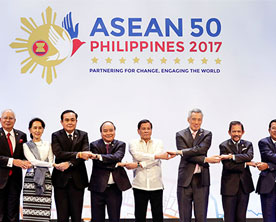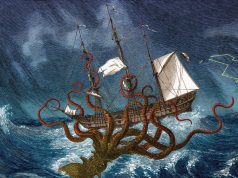This year, the Association of South East Asian Nations (ASEAN) is celebrating its 50th founding anniversary with the theme “Partnering for Change Engaging the World.” The Philippines is hosting the 31st ASEAN Summit in Manila, expecting head of states of the 10 member-nations, invited leaders from friendly nations and 3,000 delegates on November 10-15.
The ASEAN, founded in 1967 by Indonesia, Malaysia, Philippines, Singapore and Thailand is now a 10-member block with the inclusion of Brunei, Cambodia, Laos, Myanmar and Vietnam, with Timor Leste is sitting as an observer. Collectively, the ASEAN economy now boast as 6th largest GDP globally and 3rd in Asia. The economic environment made the block an attractive investment destination. Its proximity to China enables it also to benefit from the investments from the One-Belt-One Road (OBOR) initiative. Traditionally close to the US and generally the West, there is a tendency that the block is shifting to the emerging power in the region – China.
Shifting sides
The Philippine government which has recently concluded military campaign in Marawi City against the ISIS-inspired Maute Group is agog with preparations and security arrangements for the summit. The five-month siege resulted in the killing of rebel leaders Isnilon Hapilon and the Maute brothers, several hundred of deaths on both sides, hundreds of thousands of internallydisplaced persons and a totally destroyed city. Conscious of possible retaliation, surveillance and tracking of terrorist cells is being augmented to prevent possible maneuvers to disrupt the summit and give the government a black eye in the international community. Another domestic concern is the increasing opposition to President Duterte as the number of extra-judicial killings (EJK) reached to more than 13,000 resulting from his war on drugs. The opposition has claimed only the poor were killed and no drug lords were put to justice. A recent smuggling attempt at the Bureau of Customs amounting to 6.4 billion pesos ( $128 million) implicated the president’s son and some Chinese traders and facilitators, but has been left on the sidelines without prosecuting anybody.
President Duterte’s foreign policy shift from the West to the arms of China also upset many people. The Philippines traditionally a close ally of the US and generally the West, President Duterte expressed his administration’s breaking away. He bad-mouthed former President Obama, calling him a ‘son of a whore’ when his war on drugs campaign was critiqued. Not only Obama, even the Pope received acerbic words from the President. Very recently, the Secretary of the Department of Foreign Affairs (DFA) Alan Peter Cayetano expressed it will reject aids from UK and the EU, only to retract the statement later.
Away from the West and into the arms of China (and Russia). Articulating a new foreign policy, the Duterte administration tried to swing to China by not raising up the issue of arbitral ruling on the West Philippine Sea. It has allowed China to occupy the territory and gave the excuse that the country cannot win a war with the giant neighbor. The President also placed its bet on China as it expect support for its economic program with loans and investments. Dubbed as Dutertenomics, the program is anchored at a massive infrastructure building for the country to catch-up with its more developed neighbors.
Main issues at the summit
As the host of the summit, the subjects that will be discussed will be selected to make sure it reflect the common agenda of the member-nations. A short list of topics may include the following:
On top of the agenda may be the issue of terrorism. The spread of ISIS-inspired terrorism after the fall of the caliphate in the Middle-East is a reality that has to be addressed. It was observed that among the dead in the Marawi siege are Malaysian nationals, which reflected a growing cross-border activities of Islamic radical groups. A joint effort among Philippines, Malaysia and Indonesia has been established recently to deter the growth of radical groups that may try to establish a terror network in the region.
The North Korea nuclear program is another security on the agenda. With China unable to control North Korea, small countries among them ASEAN countries may be sucked to the conflict that may arise. The condition might also trigger the race to build nuclear weapons in Asian countries directly threatened by North Korea. Japan and South Korea for example can quickly build nuclear weapons with its technological advantage. A nuclear-armed Asia will not be a good place to be if a nuclear war accidentally or intentionally happen.
The possibility of the economic issues like the Asian Economic Community (AEC) being sidelined is a possibility. Expectations were high, but despite its launching in 2015, the process has been slow. Political uncertainties in the West and the slowing down of China may have affected the integration,but many people are still hopeful that the economic integration will help energize the economy of the region and its member-countries. Fast-tracking the integration hopefully is among the agenda of the summit, as reducing poverty remains to be a main concern in the region.
With the block’s policy on the noninterference to domestic issues, human rights advocacy will be glossed over. Issues like the EJK in the Philippines and the Rohingya in Rakhine will not be discussed, t h e s a m e w i t h t h e persecution o f t h e opposition in C a m b o d i a . Strengt h e n i n g o f e l e c t o r a l process and democratic institutions will remain on the sidelines.
Gainers and losers
China is the main gainer in the new arrangement as it silenced the Philippine government from pursuing its claim won in the international court of arbitration. China has now unimpeded access to the West Philippine Sea and has buttress its claim by building fortified islands on top of the shoals. To sweeten the deal, China has dangled loans and investments to the Philippine government as part of the quid pro quo for keep the Duterte administration within its circle of friends. Consistent with is support, it donated thousands of rifles and ammunitions to the Armed Forces of the Philippines during the height of the Marawi City siege.
Playing catching up is the United States. For the first trip in Asia, President Trump is attending the summit and try to mend the rift. Unlike Obama, Trump is more palatable to President Duterte. Malacanang Palace is exited to receive President Trump, with the end view of appeasing those who were alienate when President Duterte declared his breaking away with the US.
How the Trump administration will deal not only with the Philippines but also with the rest of the ASEAN memberscountries individually and as a block, is also an essential element that has to be observed during the summit. Obama’s Pivot to Asia may have been too late, and Trump has to impress on the ASEAN leaders what will be the role of US in the region. Either it will remain as a major player, or it will relinquish its traditional role to China.










